The Coronation of Poppea, King's Head Theatre
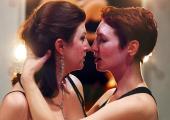


As Handel’s Messiah is to Christmas so the music of Bach is to Lent. Every Passiontide churches and concert halls are flooded with performances that include everything from dainty consort renderings of the St John Passion to choral societies delivering all but symphonic St Matthew Passions. Mightiest of all, however, is The Bach Choir’s annual concert. Performed on Palm Sunday to a reliably sold-out Royal Festival Hall, it’s a fixture of over 80 years' standing and a rare opportunity to hear the work sung in English. Love or hate the vernacular approach, it’s hard to argue with the sheer force of almost 200 singers accompanied by a gloriously inauthentic, 50-strong incarnation of Florilegium.

Ariosto’s epic poem Orlando Furioso has yielded more than its fair share of operatic spin-offs. Inspiring three operas apiece from both Handel and Vivaldi, as well as works from Lully, Haydn, Caccini and Rameau, its vivid stories of love, magic and revenge were plundered freely by composers for the better part of two centuries. It’s a rich seam of works, and one the Barbican is celebrating with a triptych of concerts. We’ve already had an exceptional Alcina from Minkowski and Les Musiciens du Louvre, and Il Complesso Barocco will present Ariodante in May, but last night it was the turn of Jean-Christophe Spinosi and Ensemble Matheus with Vivaldi’s Orlando Furioso.
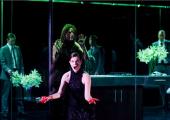
Wars have no end. Soldiers may come home, battlefields may be vacated, peace treaties signed, but scars remain. The violence of combat has a way of revisiting itself on the victors and vanquished and ravaging soul and state.
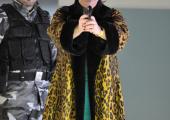
A highlight of the London Handel Festival’s annual season is the opera, generally chosen from one of the dustier, more spidery corners of the composer’s repertoire. What a surprise then to see Rodelinda taking its turn this year. An undisputed classic, it’s also the opera that played perhaps the biggest part in reviving Handel’s fortunes on the stage in the 20th century. With aria after aria of generous and dramatic vocal writing and plenty of crowd-pleasing numbers, it’s also a natural showcase for the young singers of the Royal College of Music – perhaps the only ones having more fun than their audience last night.

Their record label describes them rather laboriously as “a Baroque super-group of four superstar Baroque instrumentalists”, but the Retrospect Trio don’t need any fancy titles to prove their quality. Bringing together violinists Sophie Gent and Matthew Truscott (leader of the OAE) and Jonathan Manson on bass viol (principal cello of the Amsterdam Baroque Orchestra) under the direction of young harpsichordist Matthew Halls, this ensemble is all about unshowy musicianship. Joined last night by soprano Julia Doyle they offered up some of the best Purcell London is likely to see this year – with performances from Mark Padmore and the Britten Sinfonia, not to mention Scholl, Jaroussky and Ensemble Artaserse still fresh in the ears, that’s saying something.

Something of a bad boy in the Baroque world, Philip Pickett can generally be relied on to provoke discussion. Whether it’s by teaming up with one of Rolling Stone magazine’s Greatest Guitarists of All Time, or restaging Purcell’s The Fairy Queen with tumblers, jugglers and an excess of hand luggage, there’s always an angle. While collaborators, contexts and repertoire may change, what you can generally set your watch by is the quality of the musicianship – which made last night’s concert all the more of a puzzle.
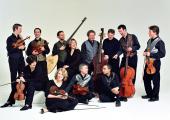
According to the wit of either Dallapiccola or Stravinsky (history is divided), Vivaldi was responsible for writing not 600 concertos, but the same concerto 600 times. It’s a joke that has lingered stubbornly in the popular imagination. Had the concerto in question been one of the Four Seasons or indeed one from L’Estro Armonico I don’t think anyone would be objecting; it’s the workaday Vivaldi, those throwaway concertos composed with his eyes on his purse and his mind on his dinner that have so diluted his reputation. Doing their best to set the record straight, erstwhile Vivaldi champions La Serenissima last night presented a programme comprised solely of concertos.

The Wigmore Hall, with its laboriously marbled and gilded period interior, doesn’t exactly scream “rebellion”. Yet for the second time in as many months its conservative classical crowd saw recital conventions discarded like the too-tight bow tie that they are. Players strolled on with relaxed ease, discovered a jam session in progress and decided to join in the fun. The guitars may have been of the Baroque variety, the drum kit replaced with tambour and tambourine, and the bass-line provided by a violone, but last night mezzo-soprano Magdalena Kožená fronted quite the coolest gig in town.
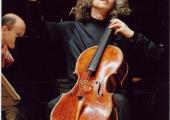
No self-mutilation or incest, but plenty of daddy issues at the Wigmore Hall last night in a musical glance through the Bach family album. Carefully keeping Johann Sebastian out of the way (presumably lest he show everyone else up and spoil the fun), Richard Egarr guided us through the work of his four composer sons. Spread across Europe from London to Hamburg and Bologna, the differing influences, fashions and character of each becomes quickly evident. Just a shame that – even in his absence – all remain so comprehensively dwarfed by their father.